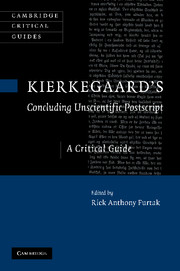Book contents
- Frontmatter
- Contents
- List of contributors
- Acknowledgments
- List of abbreviations
- Introduction
- 1 The “Socratic secret”: the postscript to the Philosophical Crumbs
- 2 Kierkegaard's Socratic pseudonym: A profile of Johannes Climacus
- 3 Johannes Climacus' revocation
- 4 From the garden of the dead: Climacus on interpersonal inwardness
- 5 The Kierkegaardian ideal of “essential knowing” and the scandal of modern philosophy
- 6 Lessing and Socrates in Kierkegaard's Postscript
- 7 Climacus on subjectivity and the system
- 8 Humor and irony in the Postscript
- 9 Climacus on the task of becoming a Christian
- 10 The epistemology of the Postscript
- 11 Faith and reason in Kierkegaard's Concluding Unscientific Postscript
- 12 Making Christianity difficult: The “existentialist theology” of Kierkegaard's Postscript
- Bibliography
- Index
- References
10 - The epistemology of the Postscript
Published online by Cambridge University Press: 04 August 2010
- Frontmatter
- Contents
- List of contributors
- Acknowledgments
- List of abbreviations
- Introduction
- 1 The “Socratic secret”: the postscript to the Philosophical Crumbs
- 2 Kierkegaard's Socratic pseudonym: A profile of Johannes Climacus
- 3 Johannes Climacus' revocation
- 4 From the garden of the dead: Climacus on interpersonal inwardness
- 5 The Kierkegaardian ideal of “essential knowing” and the scandal of modern philosophy
- 6 Lessing and Socrates in Kierkegaard's Postscript
- 7 Climacus on subjectivity and the system
- 8 Humor and irony in the Postscript
- 9 Climacus on the task of becoming a Christian
- 10 The epistemology of the Postscript
- 11 Faith and reason in Kierkegaard's Concluding Unscientific Postscript
- 12 Making Christianity difficult: The “existentialist theology” of Kierkegaard's Postscript
- Bibliography
- Index
- References
Summary
There have been two significant obstacles to determining the substance of Kierkegaard's epistemology. The first is the barrier of language. It is relatively easy for scholars in the English-speaking world to learn languages such as German or French. By contrast, most Kierkegaard scholars are able to piece together only a rudimentary knowledge of Danish during short stays in Denmark facilitated by research fellowships. The second obstacle to understanding Kierkegaard's views on knowledge is that his otherwise prodigious authorship includes no straightforward treatise on knowledge. The closest thing to such a treatise is, in fact, his Concluding Unscientific Postscript. A comprehensive account of the epistemological views contained in this work is beyond the scope of a brief essay. Such an account would require an entire book, and a substantial one at that. I argue elsewhere that Kierkegaard appears to subscribe in a very broad sense to the traditional view that knowledge amounts to justified true belief. A great deal of insight into the epistemology of the Postscript can thus be gained by looking closely at how the concept of truth functions in this work.
INTRODUCTION
This chapter will focus on the concept of truth in the Postscript. It will also look in detail at the significance of some of the relevant Danish terminology. The end product, I hope, will help to give the reader greater insight into the substance of the epistemology of the Postscript than it has yet been possible to attain from any secondary work in English.
Keywords
- Type
- Chapter
- Information
- Kierkegaard's 'Concluding Unscientific Postscript'A Critical Guide, pp. 190 - 203Publisher: Cambridge University PressPrint publication year: 2010
References
- 3
- Cited by

